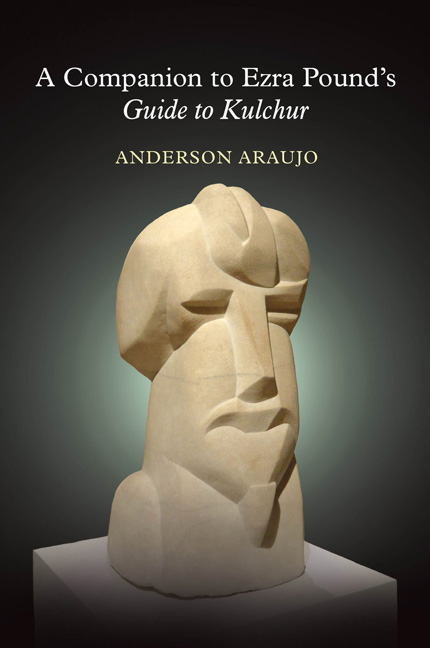Book contents
- Frontmatter
- Contents
- Acknowledgments
- Abbreviations
- Introduction
- Guide to Kulchur
- Part I
- Section I
- Section II
- Part II
- Section III
- 10 Guide
- 11 Italy
- 12 Aeschylus and . . .
- 13 Monumental
- Section IV
- Part III
- Section V
- Section VI
- Part IV
- Section VII
- Section VIII
- Section IV
- Part V
- Section X
- Section XI
- Part VI
- Section XII
- Section XIII
- Addenda: 1952
- Notes
- Index
10 - Guide
from Section III
- Frontmatter
- Contents
- Acknowledgments
- Abbreviations
- Introduction
- Guide to Kulchur
- Part I
- Section I
- Section II
- Part II
- Section III
- 10 Guide
- 11 Italy
- 12 Aeschylus and . . .
- 13 Monumental
- Section IV
- Part III
- Section V
- Section VI
- Part IV
- Section VII
- Section VIII
- Section IV
- Part V
- Section X
- Section XI
- Part VI
- Section XII
- Section XIII
- Addenda: 1952
- Notes
- Index
Summary
opusculus: (L.) from opusculum, “a small work, especially a minor literary work.”
Marcel Duchamp: (1887–1968), French artist and avantgarde theorist whose painting Nude Descending a Staircase No. 2 (1912) made him notorious, as did his unfinished The Bride Stripped Bare by her Bachelors, Even, also known as The Large Glass (1915–1923), a treatment of “cerebral, mechanized bodies with nongenerative sexualities.” He exhibited the latter work at the New York Armory show of 1913, to which Picabia also contributed. Together, they shared a fascination with erotic machines. A leading figure in New York Dada, Duchamp's series of “readymades” includes most famously his urinal piece, Fountain (1917). David Hopkins demonstrates that Pound's suggestion of Duchamp's influence on Picabia is accurate, as the latter artist “produced works, often in response to Duchamp, conflating mechanical form and anatomical reference.”
Eric Satie: Erik Satie (1866–1925), French composer, whose connection with Dada painters and poets dates almost to the arrival of the movement in Paris in January 1920. In November of that year, Picabia quipped “Erik est Satierik” in his Dadaist magazine, 391. Satie contributed two articles to the January issue of the journal's illustrated supplement, Le Pilhaou-Thibaou.
Bayle and Voltaire: Cf. notes GK 54, 50, respectively. reductio ad absurdum: (L.), “reduction to the absurd,” denotes the “practice of demonstrating the falsity of a hypothesis, principle, etc., by showing that the consequence of assuming it to be true is something absurd or contradictory.”
“Europe exhausted by the conquest of Alsace Lorraine”: Canto 87 attributes this remark to Picabia (87/590).
idées reçues: (Fr.), “received ideas,” or generally accepted notions or opinions.
Dada: International anarchic avant-garde movement begun by poet-theorist Hugo Ball (1886–1927) in the Cabaret Voltaire he founded in February 1916 in the Spiegelgasse in Zurich. Its founding members also included the performer Emmy Hennings (1885–1948), the poet Tristan Tzara (1896–1963), the artist Marcel Janco (1895–1984), poet-artist Jean Arp (1886–1966), and the dancer Sophie Taeuber (1889–1943).
- Type
- Chapter
- Information
- A Companion to Ezra Pound's Guide to KulcherGuide to Kulcher, pp. 122 - 126Publisher: Liverpool University PressPrint publication year: 2018



